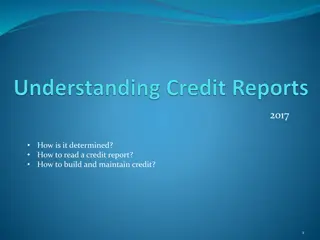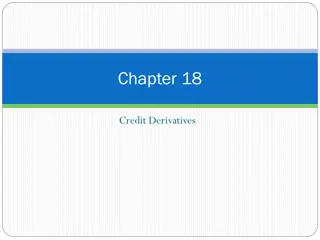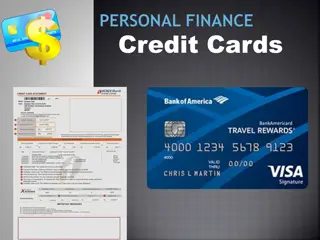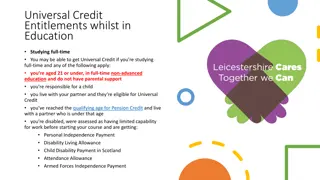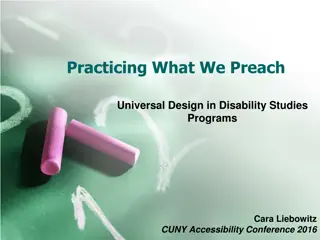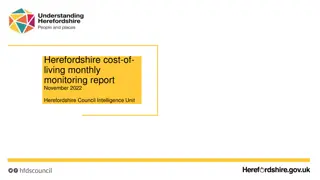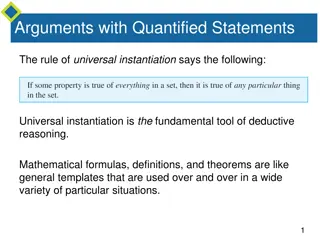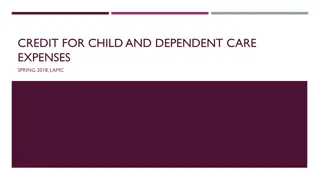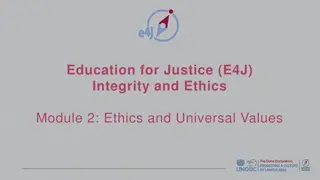Challenges and Experiences with Universal Credit Implementation
Universal Credit is a means-tested benefit introduced for working-age individuals in the UK to simplify the benefits system and incentivize paid work. The rollout spans from 2013 to 2023 and includes key changes like monthly payments, digital claims, and intensified conditionality. However, single parents and individuals with caring responsibilities express challenges in meeting work-related requirements and balancing childcare responsibilities under the new system. Issues such as lack of consideration for caring responsibilities and pressures to prioritize work over family obligations are highlighted by participants' feedback.
Download Presentation

Please find below an Image/Link to download the presentation.
The content on the website is provided AS IS for your information and personal use only. It may not be sold, licensed, or shared on other websites without obtaining consent from the author. Download presentation by click this link. If you encounter any issues during the download, it is possible that the publisher has removed the file from their server.
E N D
Presentation Transcript
Universal Credit New means tested benefit for working age people Gradual roll out: 2013-2023 Government s aims: Simplify the benefits system Improve incentives to undertake paid work Key changes: Monthly payment Digital claims Single taper rate Conditionality and sanctions intensified
Age of youngest child Work-related requirements Under one You don t need to look for work in order to receive Universal Credit. Age 1 You will be asked to attend work focused interviews with your work coach to discuss plans for a future move into work. You will be expected to take active steps to prepare for work. Age 2 Age 3 or 4 You will be expected to work a maximum of 16 hours a week (or spend 16 hours a week looking for work). Age 5 12 You will be expected to work a maximum of 25 hours a week (or spend 25 hours a week looking for work). Age 13 and above You will be expected to work a maximum of 35 hours a week (or spend 35 hours a week looking for work). Source: DWP 2017 Universal Credit: Further information for families
Source: Gingerbread 2018, Unhelpful and unfair? The impact of single parent sanctions
Participant Single or joint Number of Highest Region Age of claim children qualification participant College certification Postgraduate diploma Degree Degree College certification College certification A-Levels Abby Joint 2 Yorkshire 20s Angie Single 1 Yorkshire 40s Anwen Claire Gemma Joint Single Single 2 1 2 North East North West Yorkshire 30s 20s 20s Helen Single 1 North West 30s Kim Joint 5 East of 30s England South West GCSEs 20s Nicky Single 1 College certification Degree Stephanie Joint 2 South West 20s Vicky Single 1 Yorkshire 30s
She asked me what I wanted and we talked it through together for what would be best within my circumstances. Nicky, lone mother, one child They didn't really talk about that [caring responsibilities] to me much but I don't think they really care about that. They made me feel as though I just needed to get back to work. They didn't really care about how I would find childcare for training or how it would affect my children. Stephanie, coupled mother, two children In terms of what they write on the Commitment it s very by the book and so it s like strict...they re expecting you to do all these things and they don t think about care and you ve got a child at home. Helen, lone mother, one child
In order to do that job-search Im having to shirk mothering responsibilities. Anwen, coupled mother, two children I ve got her older brother looking after her. You know he s never looked after her so much as he has done in the last five months. Anwen, coupled mother, two children I don't think they understand how hard it is to care for children and how much of your time it takes up. Stephanie, coupled mother, two children Things that are really important like being able to read with them after school and being able to go out and buy them a pair of shoes because you ve got time. Those things are not seen as important you know they are important. Anwen, coupled mother, two children
I find a time where if hes playing out in the garden Ill just sit in the garden with the tablet and do a little bit or I do a bit when he s in bed. Even when he s in the bath sometimes I sit next to him and just check my emails. Helen, lone mother, one child It's an awful lot of hassle and stress, and they make you feel so low. Stephanie, coupled mother, two children
We have made sure we have never missed an appointment and we are doing more than what is actually asked. Kim, coupled mother, five children I don t give them an inch. I don t give them any opportunity to say you ve not done this we re going to sanction you. I cover my back thoroughly. Anwen, coupled mother, two children Either one of us drops the ball that s a loss of money...you can t risk that ball being dropped or it happening for stupid reasons. Anwen, coupled mother, two children
Universal Credit policy fails to value and recognise women s roles and responsibilities leading to adverse impacts for women and their caring responsibilities. The joint claim is problematic for the citizenship rights of partnered women. Subjecting mothers to conditionality works against aims to redefine citizenship so that it is more inclusive of women.
Current research Investigating how the conditionality within Universal Credit affects: mothers employment trajectories the valuing of informal care mothers agency in relation to engagement in informal care and paid work Methods: Qualitative longitudinal research (two waves of interviews, nine months apart) Aim: recruit twenty-five mothers who are in receipt of Universal Credit and who are required to prepare for work or job-search Progress to date: Fourteen mothers from one city recruited and interviewed (twelve single mothers, two coupled mothers)


